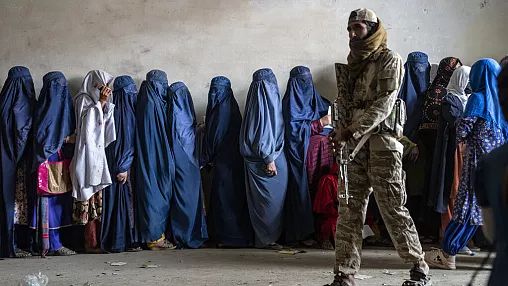EU Condemns Taliban’s Ban on Medical Education for Women in Afghanistan


Brussels, April 27, 2024 – The European Union has strongly condemned the Taliban’s recent decision to prohibit medical education for women in Afghanistan, labeling the move as a severe setback for gender equality and healthcare advancement in the region. This condemnation comes amid growing international concerns over the Taliban’s policies that restrict women’s rights and access to education.
EU’s Official Statement and Reactions
In a unified statement released today, the European Commission expressed deep disappointment and concern over the Taliban’s ban. “The European Union unequivocally condemns the Taliban’s decision to ban medical education for women. This regressive policy not only undermines the progress made in women’s education and empowerment but also jeopardizes the healthcare system in Afghanistan,” the statement read.
Commissioner for International Partnerships, Janusz Wojciechowski, emphasized the importance of inclusive education in building a resilient and prosperous society. “Excluding women from medical education is a direct attack on their rights and severely hampers the ability to address the critical healthcare needs of the Afghan population,” Wojciechowski stated.
Impact on Afghanistan’s Healthcare Sector
Experts warn that the ban will have dire consequences for Afghanistan’s healthcare infrastructure. Women constitute a significant portion of the healthcare workforce, and their exclusion from medical education will lead to a shortage of qualified healthcare professionals, exacerbating existing challenges in the sector.
Dr. Amina Rahimi, a healthcare analyst, highlighted, “Women play a crucial role in providing accessible and culturally sensitive healthcare. Their absence from medical education will not only reduce the quality of healthcare services but also limit the community’s trust in the medical system.”
International Community’s Response
The EU’s condemnation aligns with broader international disapproval of the Taliban’s restrictive policies. The United Nations and various human rights organizations have also voiced their opposition, calling for the immediate reversal of the ban and the restoration of women’s rights to education and professional development.
Human Rights Watch executive director, Sarah Thompson, stated, “The Taliban’s actions are a blatant violation of international human rights norms. Ensuring that women have access to education, especially in critical fields like medicine, is essential for the overall well-being and progress of Afghanistan.”
Potential Diplomatic and Economic Repercussions
The EU has hinted at possible diplomatic and economic repercussions if the Taliban does not reverse its decision. Potential sanctions and the suspension of humanitarian aid are among the measures being considered to pressure the Taliban into compliance with international standards on women’s rights and education.
Calls for Continued Support and Advocacy
Amid the condemnation, the EU has reiterated its commitment to supporting Afghan women and advocating for their rights. Initiatives aimed at providing alternative educational opportunities and supporting female healthcare workers are being discussed to mitigate the impact of the ban.
“We will continue to stand in solidarity with Afghan women and work tirelessly to ensure that their voices are heard and their rights are protected,” added Wojciechowski.
Recent Posts
Investor Confidence in the Eurozone Increases Despite Inflation Concerns
Investor confidence in the Eurozone has shown an unexpected rise, even as inflation rates remain…
Stock Market Opens the Week with a Downturn
The stock market began the week on a negative note, experiencing a sharp decline across…
3,500 Bank Accounts Seized in Italy, Including Those Linked to Prime Minister Meloni
Italian authorities have recently seized 3,500 bank accounts as part of an ongoing investigation into…
40% Additional Tax on Profits in Italy Negatively Affects Markets
A new 40% additional tax on profits, imposed by the Italian government, has created turbulence…
Deutsche Bank Lays Off 100 Employees as Part of Cost-Cutting Measures
Deutsche Bank, one of Europe's largest financial institutions, has laid off 100 employees as part…
Morgan Stanley’s Minimum Wage Forecast: What to Expect in the Coming Years
Morgan Stanley, a leading global financial services firm, has recently released its forecast on minimum…